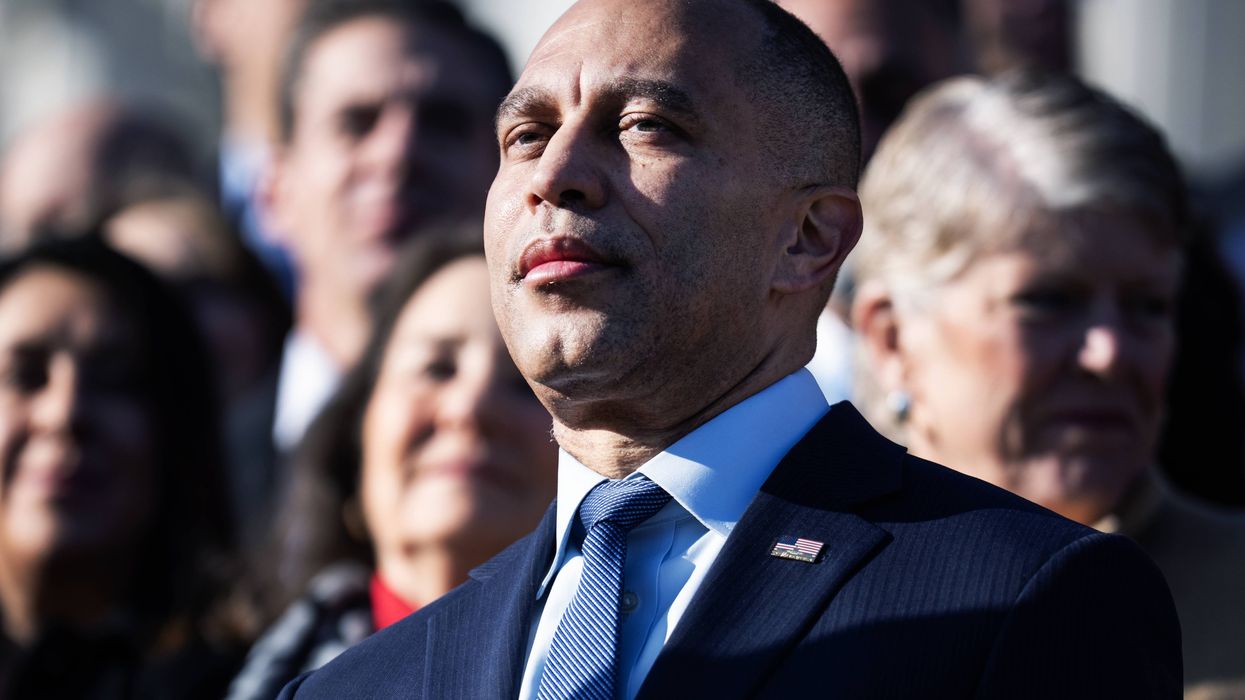April, 03 2009, 11:37am EDT
For Immediate Release
Contact:
Brad Luna 202/216.1514 Cell: 202/812.8140
Trevor Thomas 202/216.1547 Cell: 202/250.2758
Iowa Becomes First Midwestern State to Recognize Marriage Equality for Gay and Lesbian Couples
Human Rights Campaign Hails Unanimous Iowa Supreme Court Decision as Part of Growing Trend Towards Marriage Equality Across the Country
WASHINGTON
The
Human Rights Campaign, the nation's largest lesbian, gay, bisexual and
transgender (LGBT) civil rights organization, applauded the Iowa state
Supreme Court's unanimous 7-0 decision today ruling that the equal
protection provision of Iowa Constitution guarantees gay and lesbian
couples the same right to marry as heterosexual couples. As a result
of the court's decision in Varnum v. Brien, Iowa becomes the
first state in the Midwest and the third in the nation to now recognize
marriages for gay and lesbian couples.
"This
is a truly historic day for Iowa and a proud day for every American who
believes in the promise of equal rights and fairness for all," said
Human Rights Campaign President Joe Solmonese. "The Iowa Supreme Court
did its job by recognizing that gay and lesbian couples who form
committed relationships and loving families deserve the same level of
respect afforded to heterosexual couples. The unanimous court made
forcefully clear that the state constitution guarantees the same rights
and protections for all Iowans. This decision strengthens Iowa families
and makes a strong statement for equality all across the nation."
"We
congratulate and commend Lambda Legal, the numerous organizations and
individuals who briefed the Supreme Court, and, of course, the
courageous plaintiff couples and their families who looked to the
courts to vindicate their rights," said Solmonese. "We also thank One
Iowa for their hard work across the state to ensure that gay and
lesbian couples and their families receive the recognition that they
rightfully deserve."
The
ruling is similar to past Supreme Court decisions in Massachusetts,
Connecticut and California that also found state constitutional
violations where gay and lesbian couples were denied the right to
marry. (The California decision was affected by Proposition 8, a
change to the state constitution approved by voters last November. A
legal challenge to Proposition 8 is pending.)
Speaking
for the unanimous court, Justice Mark S. Cady wrote that "[w]e are
firmly convinced the exclusion of gay and lesbian people from the
institution of civil marriage does not substantially further any
important governmental objective." The court rejected the possibility
that civil unions-or any institution other than civil marriage-could
satisfy the guarantees of the state constitution.
The Varnum
case began in December 2005, when Lambda Legal filed suit in Iowa
District Court on behalf of six gay and lesbian couples (later amended
to include three of their children). In August 2007, the Iowa District
Court ruled that it was unconstitutional to deny gay and lesbian
couples the right to marry. The District Court granted a stay of the
decision pending appeal to the Iowa Supreme Court.
A growing number of states across the
country are providing relationship recognition to gay and lesbian
couples. Two states, Massachusetts and Connecticut, already permit gay
and lesbian couples to marry under state law. New York recognizes
marriages by gay and lesbian couples legally entered into outside of
the state. In recent weeks state legislatures in New Hampshire and
Vermont have passed bills that would recognize marriages by gay and
lesbian couples, which could make them the first states to enact
marriage equality legislatively. (The Vermont House of Representatives
voted yesterday in support of marriage equality after the state Senate
approved the bill last month.)
In addition to the three states that
now provide for marriage equality under state law, eight states plus
Washington, D.C. have laws providing at least some form of state-level
relationship recognition, short of marriage, for gay and lesbian
couples. Five of these states-California, New Hampshire, New Jersey,
Oregon, and Vermont-plus Washington, D.C. provide gay and lesbian
couples with access to the state level benefits and responsibilities of
marriage, through either civil unions or domestic partnerships.
Key results from the ruling:
- Gay
and lesbian couples in Iowa will soon be able to obtain civil marriage
licenses and receive the same respect and protections afforded to all
married couples under state law. The decision becomes effective in as
soon as 21 days unless the state files a petition for rehearing. - Churches
and other religious institutions will not have to recognize or perform
ceremonies for these civil marriages, as the court's opinion expressly
states: "A religious denomination can still define marriage as a union
between a man and a woman, and a marriage ceremony performed by a
minister, priest, rabbi, or other person ordained or designated as a
leader of the person's religious faith does not lose its meaning as a
sacrament or other religious institution. The sanctity of all
religious marriages celebrated in the future will have the same meaning
as those celebrated in the past. The only difference is civil marriage will now take on a new meaning that reflects a more complete understanding of equal protection of the law." - The
court's decision does not entitle gay and lesbian couples in Iowa to
receive the federal rights and benefits extended to married couples.
The so-called federal Defense of Marriage Act (DOMA) discriminates
against gay and lesbian married couples by denying them over 1,000
federal rights, benefits, and responsibilities including social
security benefits, the ability to file a joint federal tax return, and
the right to petition for a spouse to immigrate. A lawsuit filed in
federal court in Massachusetts last month challenges a portion of DOMA. - Other states may
legally recognize the civil marriages of gay and lesbian couples
performed in Iowa in the same way they recognize out-of-state marriages
by heterosexual couples.
The Human Rights Campaign and Human Rights Campaign Foundation signed onto an amicus, or "friend of the court," brief in the Varnum
case to support and further explain the argument for extending civil
marriage rights to gay and lesbian couples under the state
constitution. A number of civil rights organizations, elected
officials, religious groups, historians, law professors, child
advocates and others also either signed or filed briefs of their own in
favor of extending civil marriage laws to gay and lesbian couples.
The Human Rights Campaign represents a grassroots force of over 750,000 members and supporters nationwide. As the largest national lesbian, gay, bisexual and transgender civil rights organization, HRC envisions an America where LGBT people are ensured of their basic equal rights, and can be open, honest and safe at home, at work and in the community.
LATEST NEWS
Democrats to Spotlight Trump Election Threats at January 6 Hearing
A panel aimed at fighting GOP efforts to "rewrite history" regarding the US Capitol attack will also "examine ongoing threats to free and fair elections posed by an out-of-control Trump administration."
Dec 30, 2025
At a hearing on the fifth anniversary of the January 6, 2021 attack on the US Capitol next week, House Democrats plan to look back as well as forward—countering Republicans' efforts to "rewrite history and whitewash" the attempted insurrection by President Donald Trump's supporters and warning of the GOP's threats to upcoming elections and to US democracy.
The event next Tuesday will be an unofficial one, as Democrats are in the minority and do not have the authority to call formal hearings.
House Minority Leader Hakeem Jeffries (D-NY) said in a Dear Colleague letter to other lawmakers on Monday that the hearing would shed light on the "toxic priorities" of Trump, who after taking office in January issued blanket pardons for nearly 1,600 people who were charged in connection to the January 6 attack.
" Donald Trump promised to lower the high cost of living on day one of his presidency," wrote Jeffries. "One year later, costs are out of control, America is too expensive, and Republicans believe that the affordability crisis is a hoax. They have done nothing to lower costs for everyday Americans, but are gutting healthcare and enacted massive tax breaks for their billionaire donors."
While doing nothing to make life more affordable for families—and helping to make household grocery and electricity bills higher—Trump has pardoned hundreds of people who "brutally assaulted law enforcement officers" on January 6, including several who have been charged with new crimes and "a troubling number" who "have been arrested for child molestation, sexual assault, and kidnapping," said the Democratic leader.
"Republicans own the failed economy, their broken promise to lower costs, and the crime spree the dangerous criminals pardoned by the president have visited on our country," wrote Jeffries.
The mob on January 6 attempted to stop the certification of the 2020 election, which Trump had spent weeks at that point insisting had been stolen from him and which the president and his allies continue to deny was won by former President Joe Biden.
But Republicans including House Speaker Mike Johnson (R-La.) have made efforts to sanitize the attack, which took place after Trump held a rally urging his supporters to march "over to the Capitol building to peacefully and patriotically make your voices heard" and said they would see whether "Republicans stand strong for integrity of our elections."
After Trump took office this year, Johnson announced a new congressional subcommittee that would expose "the false narratives peddled by” the previous bipartisan panel that issued a report in 2022 about Trump's efforts to overturn the 2020 election results and his encouragement of the attack.
Rep. Bennie Thompson (D-Miss.), who led the bipartisan committee, will also oversee next Tuesday's hearing.
In addition to exposing "the election deniers who hold high-level positions of significance in the executive branch," wrote Jeffries on Monday, the panel "will examine ongoing threats to free and fair elections posed by an out-of-control Trump administration."
The president has pushed Republican-led state legislatures in Texas, Missouri, North Carolina, and other states to draw new congressional maps to help the GOP maintain power in the 2026 midterm elections.
He signed an executive order in March that purported to require proof of citizenship for people who register to vote—an effort that was blocked by a federal judge in October—and the US Department of Justice has sued several states to compel them to share voter registration data with the federal government.
Legal experts have emphasized that the president does not have the authority to change how elections are run, despite Trump's continued efforts.
Jeffries said the January 6th Select Committee would join Thompson in leading the hearing, which is scheduled for 10:00 am Eastern time next Tuesday.
Keep ReadingShow Less
'This Is an Act of War': CIA Carried Out Drone Strike on Port Facility Inside Venezuela
One expert called the reported drone strike a "violation of Article 2(4) of the UN Charter and the Take Care Clause of the Constitution."
Dec 30, 2025
The US Central Intelligence Agency reportedly carried out a drone strike earlier this month on a port facility inside Venezuela, marking the first time the Trump administration launched an attack within the South American country amid a broader military campaign that observers fear could lead to war.
CNN on Monday was first to report the details of the CIA drone strike, days after President Donald Trump suggested in a radio interview that the US recently took out a "big facility" in Venezuela, prompting confusion and alarm. Trump authorized covert CIA action against Venezuela in October.
According to CNN, which cited unnamed sources, the drone strike "targeted a remote dock on the Venezuelan coast that the US government believed was being used by the Venezuelan gang Tren de Aragua to store drugs and move them onto boats for onward shipping."
To date, the Trump administration has not provided any evidence to support its claim that boats it has illegally bombed in international waters were involved in drug trafficking. No casualties were reported from the drone strike, and the Venezuelan government has not publicly commented on the attack.
"This is an act of war and illegal under both US and international law, let’s just be clear about that," journalist Mehdi Hasan wrote in response to news of the drone strike.
Brian Finucane, senior adviser with the US Program at the International Crisis Group, called the reported drone attack a "violation of Article 2(4) of the UN Charter and the Take Care Clause of the Constitution."
"Seemingly conducted as covert action and then casually disclosed by POTUS while calling into a radio show," he added.
CNN's reporting, later corroborated by the New York Times, came after the Trump administration launched its 30th strike on a vessel in international waters, bringing the death toll from the lawless military campaign to at least 107.
The Times reported late Monday that "it is not clear" if the drone used in last week's mission "was owned by the CIA or borrowed from the US military."
"The Pentagon has stationed several MQ-9 Reaper drones, which carry Hellfire missiles, at bases in Puerto Rico as part of the pressure campaign," the Times added.
Keep ReadingShow Less
30th Strike in Trump's High-Seas Kill Spree Claims 2 More Lives
At least 107 people have been killed in US bombings of boats that the Trump administration claims—without evidence—were involved in narco-trafficking in the Caribbean Sea and Pacific Ocean.
Dec 29, 2025
The US military said Monday that two alleged drug smugglers were killed in the bombing of another boat in the eastern Pacific Ocean, but—as has been the case throughout 30 such strikes—offered no verifiable evidence to support its claim.
US Southern Command (SOUTHCOM) said on X that, on orders from Defense Secretary Pete Hegseth, "Joint Task Force Southern Spear conducted a lethal kinetic strike on a vessel operated by Designated Terrorist Organizations in international waters."
"Intelligence confirmed the vessel was transiting along known narco-trafficking routes in the eastern Pacific and was engaged in narco-trafficking operations," SOUTHCOM added. "Two male narco-terrorists were killed. No US military forces were harmed."
According to the Trump administration's figures, at least 107 people have been killed in 30 boat strikes since early September. The administration has tried to justify the strikes to Congress by claiming that the US is in an “armed conflict” with drug cartels, while legal scholars and Democratic US lawmakers counter that the bombings are likely war crimes.
War powers resolutions aimed at reining in President Donald Trump’s ability to extrajudicially execute alleged drug traffickers in or near Venezuela failed to pass the Senate in October and the House earlier this month.
Monday's strike came amid Trump's escalating aggression against Venezuela, including the deployment of warships and thousands of US troops to the region, authorization of covert CIA operations targeting the country's socialist government, and threats to launch ground attacks.
Trump claimed Monday without providing evidence that US forces destroyed a "big facility" in an unspecified country where narco-traffickers' "ships come from."
Keep ReadingShow Less
Most Popular


